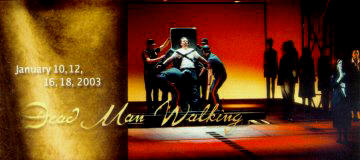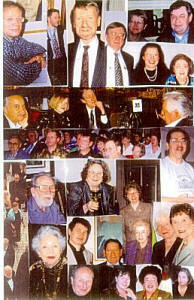|
The
Wagner Society |
|
|
|
FOR IMMEDIATE RELEASE Dead Man Walking - An Opera
|
|
Dead Man Walking An Opera by Jake Heggie and Terrance McNally Based on the Book by Sister Helen Prejean Conductor Production Director Set Designer Costume Designers Joseph De Rocher Sister
Helen Prejean
Sister Rose Mrs. De
Rocher Austin Lyric Opera |
Austin Lyric Opera has served up a good old-fashioned Blue Plate Special for its 2002-2003 season: salad, main course, and dessert.
The lettuce and tomato house salad served last November was Verdi's La Traviata. It was not enticing enough to get me to drive the three hours from Dallas to Austin. I passed.
The peach cobbler desert will be Puccini's La Boheme, coming in March. These days, I usually pass on desert, too.
But the main course of this Blue Plate Special was the new opera by Jake Heggie and Terrance McNally, Dead Man Walking. This time, Austin Lyric Opera served up a big helping of Steak Americain, spicy, bloody, and raw, still steaming from the cow. And boy was it good!
Heggie and McNally have done a masterful job of adapting Sister Helen Prejeanís death penalty treatise into an opera. Watching Dead Man Walking on the stage is enough to make you feel like a deer staring into the oncoming headlights: you know it is going to hit you smack in the face, but you just can't avert your gaze as you stand frozen to the spot, watching it hurtle toward you, coming down the highway at 65 miles per hour.
Opening innocently enough on a starlit night, an attractive teenage boy and girl are playing around naked in the dark, listening to their car radio after a skinny dip in the lake, when suddenly they are set upon by two guys and brutally murdered, in full view of the audience, thus setting the stage for the disturbing drama to come.
The scene immediately and incongruously shifts to a grade school classroom in New Orleans, where Sister Helen Prejean and her fellow nuns are teaching a singing class to a group of charming ghetto children. Soon, Sister Prejean begins voicing her concerns about becoming a spiritual advisor to a death row convict, of whose guilt we have no doubt, and the story begins to unfold, taking us on her personal journey though self-doubt, agony, horror, forgiveness, and, finally, redemption. This is truly the stuff of grand opera.
The crux of the story is the relationship between Sister Helen Prejean and convicted murder Joseph De Rocher as she helps him face his impending execution. Mezzo-soprano Margaret Lattimore was a sensation as Sister Helen. Onstage for nearly the full three hours of the opera, her luscious voice easily filled Austinís huge Bass Hall with glorious sound. Yet her diction was flawless and her characterization subtle and sensitive. Her long opening aria in the car, as she makes the hot drive to Angola Prison, wondering if she has the personal strength to confront this murderer, is probably the best moment in the show.
Baritone John Packard seems to own the role of convict Joseph de Rocher. He looks the part, lean, pale and mean, with a tidy goatee and mustache adding to the menacing personality of the murderer that he creates so convincingly. His most impressive moment comes during his aria at the opening of Act II, when not only does he project his anger and frustration at his condition, but then proceeds to drop to the floor, clad only in shorts and t-shirt, to do two sets of 10 perfect push-ups - with claps - to work off his anger. Sadly, this music seems to be taking a toll on Packardís beautiful baritone voice. He sounded tight and heavy much of the evening, and when he was dressed in the close-fitting t-shirt, I was clearly able to see that he was not supporting the sound properly.
Other notable moments were made by Katherine Day as Josephís mother, in her scene in which she pleads for her sonís life before the Pardon Board, and NaGuanda Miller as Sister Rose, in her second act duet with Sister Helen. The sextet in Act I, sung by the parents of the murdered children, Sister Helen, and Mrs. De Rocher, is a highlight of the score.
The sets and costumes in Lenoard Fogliaís production were spectacular. Brian Nasonís lighting was gorgeous and subtle. We were told during the pre-curtain lecture that there was a 1,500-pound catwalk, numerous follow spots, and even a 2,500-pound real car. 230 people labored back stage to make the stage picture come alive. Chain link fences rose and fell to mark the various level of Angola State Prison. The backdrop for the Pardon Board scene, with its legend "Equal Justice for All" was very successful, as were the projected black and white slides used to take us along on Sister Helenís car trip to the prison. The final scene in the execution chamber, perfunctory and mechanical after a big buildup, was especially horrifying.
Yet, somehow, Dead Man Walking does not quite manage to come together properly. The opera is touted as being about redemption and forgiveness, and all of that was carefully portrayed. Nevertheless, it did not ultimately work for me. I was impressed, but not moved. I think the fault is with Heggie and McNally. Especially McNally.
You see, Terrance McNallyís libretto is too good. The language is very American, with short, choppy, irregular sentences, all very natural sounding. It is so good that it does not need to be amplified with real music. It could easily work as a stage play on its own, with only background music.
Not only that, but the story too often crosses the line from drama to diatribe. That is to say, the libretto often becomes preachy. There is no doubt that the original book is a personal and serious study of the purpose and validity of the death penalty in modern American society. As such, it is quite compelling. However, the creators of this work proclaim their intention to be to delve into the emotions of the characters and their final transformation. Unfortunately, perhaps unavoidably, much of the material becomes political discourse after all, in the first act especially.
Jake Heggie worked diligently to make his score support the drama, and he did succeed, magnificently. There are plenty of arias, duets, and ensembles. The contrast between set pieces and dialog is clear. At no time does the music become uninteresting, trivial, or wrong for the moment. And he really knows how to write for the voice, concentrating on the middle register for maximum clarity and ease of projection, unlike many modern composers who keep their singers screaming the whole time, and who never know how to create a climax..
Each of the major characters has their own musical language, from the Gospel tune based on "Shall we Gather at the River" for Sister Helen, to the Cajon Zydeco accents used for Joseph De Rocher. Moreover, the use of pop music at key points is appropriate. But the libretto leaves no real room for the melodic invention an audience craves to fully express the emotions of the characters onstage. Instead of full flights of musical lyricism, the composer is forced to adapt his vocal lines to the language of the libretto. As a result, phrases sometimes just wander off into musical nowhere.
Nevertheless, the trip to Austin to see this new opera was time and effort well spent. I, along with the 3000 or so other patrons of Austin Lyric Opera on a nearly sold-out Thursday night, was amply rewarded with a stunning evening of musical theatre. At the end, all of us were confronted with the mixed emotion of how to react. It is tough to applaud a staged execution, but a great performance demands proper acknowledgement.
Dead Man Walking fully deserves all the attention it has been getting from audiences and press around the country. But in spite of all the hoopla, I suspect it will not become the last great American opera of the 20th century.
My friend and seat companion, John Briggs, remarked, "While I donít want to see it again, I am really glad I saw it once." I am not sure I agree. I really want to hear this music a few more times before I make a final decision.
Ed Flaspoehler, Dallas, TX
Founded in 1992 by Virginia Richey Abdo and Dr. James T. Wheeler, the Wagner Society of Dallas has had an active presence in the musical life of Dallas since that time. As the WSD continues to grow and expand, it is having a wider and wider influence among musicians and performing arts institutions in North Texas, as well as with music lovers throughout the Metroplex area. The Wagner Society of Dallas is now creating a presence on the internet as a tool to promote the music of Richard Wagner, and classical music in general, to the widest possible audience. Through the medium of its own web page, regular meetings, participation in musical events in the Dallas area, and attendance at opera performances across the country and around the world, the Wagner Society of Dallas is becoming an important source of Wagner information on the World Wide Web.
For More Information Contact:
Wagner Society of Dallas
P.O. Box 25201
Dallas, TX 75225-0201
Web Address:
www.WagnerDallas.com
E-Mail:
WSD@WagnerDallas.com
WebMaster:
eflaspo@aol.com

Welcome to The Wagner Society of Dallas. You know, as Texans, we're bound to strive for being the biggest and best of all the Wagner groups in the world over. My hope, in addition, is that we ensure your attendance and participation by offering an interesting, stimulating, and enjoyable array of meetings, recitals, and travel. Let us know if you have suggestions for future activities, and do make an effort to join in during the coming months with your membership, attendance, and above all joy of being with fellow Wagner aficionados. Roger Carroll The Wagner Society of Dallas - Virginia R.
Abdo and Dr. James T. Wheeler, The Wagner Society of Dallas is devoted to furthering the enjoyment and appreciation of the music of Richard Wagner. The Dallas group is one of many Wagner Societies all over the world. It is a non-profit organization open to anyone who enjoys the works of Richard Wagner and who would like to participate in the Societyís activities. The Wagner Society of Dallas has monthly meetings and programs which feature recitals, lectures, video screenings, receptions for opera singers and personalities, and trips to Wagner performances in other cities. We welcome music lovers who are already familiar with Wagnerís works as well as those who may want to become more knowledgeable about Wagnerís music. Member Benefits include attendance at programs, our newsletter, discount on books and CDís, advance notice of events and selected ticket services, receipt of the Membership Directory, ticket allotments to Bayreuth, and an active link with fellow Wagnerians throughout the world. |




